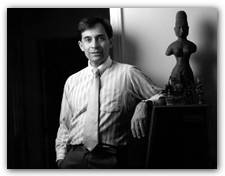Main Menu · Search ·Current Issue ·Contact ·Archives ·Centennial ·Letters to the Editor ·FAQs
![]()
| The Alumni | Yesterday's News |
| Legal Expert Abroad | Pioneering Role |
| Literary Physician | Doctor of Phishography |
For more alumni web resources, check out Harvard Gateways, the Harvard Alumni Association's website
![]()
Ronald Rotunda '67, J.D. '70, Jenner professor of law at the University of Illinois, traveled to Prague last May to help the Czech Republic develop a code of ethics for lawyers. Though not his first foray into another nation's constitutional laws, Rotunda says it was the one over which he had the most control. "It's always nice to think you may change the law," he explains, "and this was especially satisfying because it was so wholesale."
After law school, Rotunda clerked for Judge Walter R. Mansfield '32, LL.B. '35, in New York City, worked for a
 Ronald Rotunda '67 helps other countries draft laws. |
Rotunda also uses his knowledge of U.S. laws to help other nations improve their governments. He has worked on a judicial code for Romania, attended the constitutional conventions of Cambodia and Ukraine, and consulted with Moldova's Supreme Constitutional Court. "We think of exports in terms of grain or lumber or metal," he says. "We don't realize that we also export our Bill of Rights. Developing countries are very anxious to learn from this country. They want American laws, not French or Italian."
All this international experience culminated in Rotunda's invitation to Prague, where he worked with the Chamber of Advocates, an organization akin to U.S. bar associations, and the Supreme Constitutional Court, the judicial body in charge of constitutional matters. Both groups "wanted the laws to be consistent with the European Union's (EU) code," Rotunda explains. "The Czech Republic is likely to be the first former Soviet bloc nation to join the EU and NATO." He based the code on the rules of ethics governing the American Bar Association, the European Union, and the bar associations of New York, California, and Washington, D.C., and says the Czech lawyers were "tickled pink. They had very few changes." The wording of laws in the Czech Republic is traditionally vague, says Rotunda, but, he adds, "They liked my method of drafting. It may change their method, or even lead to some law reform."
Although Prague today appears a western city, Rotunda did observe remnants of the Czech Republic's Communist past. He debated with the Czech Judges' Association about issues that Americans call basic rights, like free speech and due process of law. "Just knowing another country does it differently and survives undercuts the 'can't be done' argument," he says. He also noticed that his Czech colleagues "wanted to divide power more than occurs in this country, to preserve their newly found freedom." He says he tried to give the lawyers the autonomy they requested without allowing the Chamber of Advocates to exist unchecked. All in all, he was "very pleased to have had a role in writing a code of ethics so that, when joining the EU, the Czechs won't have to change a word."
~Brooke Donovan